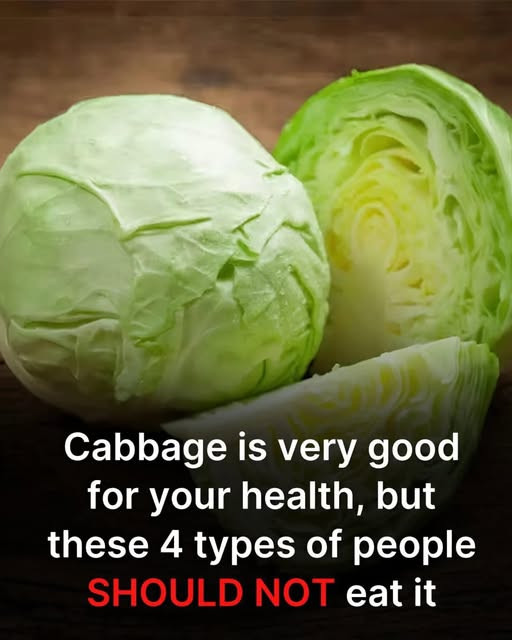ADVERTISEMENT
Absolutely! Here’s a well-researched, reader-friendly article on “4 Types of People Who Should AVOID Eating Cabbage.” While cabbage is healthy for most, there are specific health conditions and scenarios where caution is advised.
ADVERTISEMENT
4 Types of People Who Should AVOID Eating Cabbage 🥬
Cabbage is often celebrated as a superfood—low in calories, rich in fiber, and packed with vitamins like C and K. It’s a staple in many diets around the world and praised for its ability to support digestion, heart health, and even immune function.
But as healthy as cabbage may be, it’s not ideal for everyone.
Certain people may experience negative side effects or health risks from consuming cabbage—especially in large amounts or in specific forms (like raw or fermented).
Here are 4 types of people who should consider avoiding or limiting cabbage in their diets:
1. People with Hypothyroidism
Cabbage belongs to the cruciferous vegetable family (along with broccoli, cauliflower, and Brussels sprouts). These veggies contain compounds known as goitrogens, which can interfere with thyroid function.
- In people with underactive thyroids, especially those with iodine deficiency, eating large amounts of raw cabbage may further inhibit thyroid hormone production.
- Cooking cabbage significantly reduces its goitrogenic effect, but those with thyroid issues should still consult a doctor before adding it regularly to their meals.
⚠ Tip: If you have hypothyroidism, it’s safer to eat cabbage cooked and in moderation.
2. People Taking Blood-Thinning Medications
Cabbage is very high in vitamin K, a nutrient essential for blood clotting.
- If you’re taking blood thinners like warfarin (Coumadin), consuming too much cabbage (or other high-vitamin K foods) can interfere with your medication, making your blood clot more than it should.
- This doesn’t mean you need to avoid cabbage entirely, but your vitamin K intake should remain consistent.
⚠ Tip: If you’re on blood thinners, talk to your doctor before making major dietary changes.
3. People with Digestive Disorders (Like IBS or Gas Sensitivity)
Cabbage is rich in fiber and fermentable carbohydrates (FODMAPs), which can cause:
- Gas
- Bloating
- Stomach cramps
For individuals with Irritable Bowel Syndrome (IBS), small intestinal bacterial overgrowth (SIBO), or general digestive sensitivity, cabbage can trigger flare-ups or discomfort.
⚠ Tip: Try small, cooked portions first—and avoid raw or fermented cabbage (like sauerkraut) if you’re sensitive.
4. People Preparing for or Recovering from Surgery
Due to its high vitamin K content and potential effects on blood clotting, cabbage should often be avoided before or after surgery—especially if you’re taking medications that thin the blood or affect clotting.
ADVERTISEMENT
Additionally, the fiber content in cabbage can cause bloating or gas, which might be uncomfortable post-surgery, especially for abdominal operations.
ADVERTISEMENT
